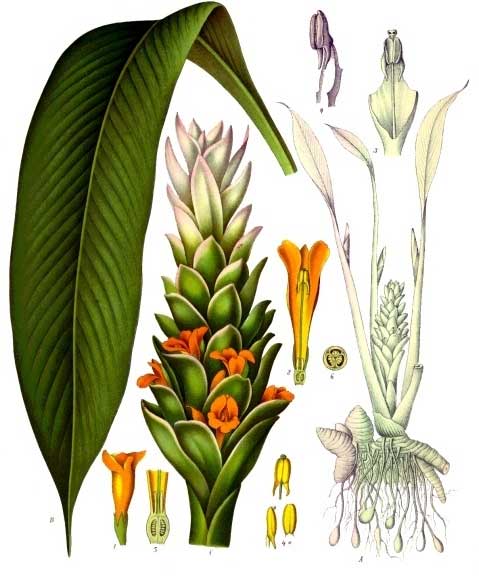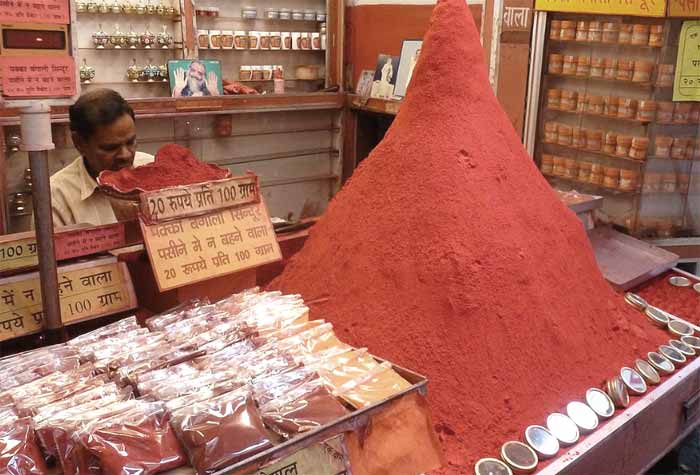Turmeric in herbal medicine

Turmeric (Curcuma longa) is a strong antioxidant often used in herbal medicine to heal tumors.
Turmeric, originally from India, is a powerful natural remedy used to treat everything from allergies to cancer. Turmeric rhizomes are usually powdered and used in teas, tonics, or ointments. Turmeric is also used in cooking to flavor foods.
Turmeric relieves arthritis pain, helps protect against blood clots, helps control cholesterol, helps the body digest fatty foods, helps strengthen eyesight, helps ease allergy symptoms, fights inflammation, increases milk production, and inhibits tumor growth.
Turmeric protects against many diseases if taken regularly.
Turmeric helps protect the liver from toxic compounds and increases the secretion of bile.
It can help the body maintain a correct weight and is often used in weight loss programs.
Turmeric is known to reduce blood platelet clumping (blood clots) and improve circulation.
Studies show that it protects against many types of cancer and heart disease.

Turmeric is a powerful antioxidant.
When used to fight the growth of tumors, studies show a decrease in size and number of tumors.
Growths on the skin can sometimes be healed with turmeric powder.
My miniature schnauzer had a ugly looking, fast growing tumor on his lip. The vet said it "looked like" cancer, and since Ed was 15 years old, there was not much to be done. Surgery wasn't an option because of his age.
I brought Ed home, made a paste of turmeric powder and olive oil, then applied it to the growth. I put it once or twice a day and every night for a month. The growth completely disappeared and never came back! Ed lived to be 18 without any more signs of cancer.
Make a paste with cold pressed olive oil and the powder. Apply it as often as possible. The growth should begin to shrink within a few weeks.
Turmeric is useful in many ways.
Turmeric reduces histamine levels and increases production of natural cortisone by the adrenal glands. This is good news for people that suffer from allergies or hives.
Laboratory studies have found that turmeric inhibits the development of cataracts, breast cancer, colon cancer, and lymphoma.
Turmeric helps detoxify the body, and protects the liver from the damaging effects of alcohol, toxic chemicals, and prescription drugs.

Turmeric is an excellent addition to the diet.
It is known to guard the stomach by killing salmonella bacteria and protozoa that can cause diarrhea.
Add turmeric to meatloaf, taco fillings, stews, vegetables, rice dishes, salad dressings, sauces, and soups. It can also be added to pickles, teas, and condiments.
Turmeric may be purchased at any grocery store.
Most turmeric comes from India.
Turmeric is a popular cooking spice in India and can be found in every household. It is a main ingredient in curries and many American mustards.
The rhizome is dried and ground into fine powder for use in cooking and herbal medicine.
Turmeric and science
Turmeric is the major source of curcumin, which is known to help manage inflammation, metabolic syndrome, arthritis, anxiety, and high cholesterol.
Combined with black pepper, bioavailability increases by 2000% so always add some black pepper to your diet when taking turmeric for medical purposes.
Curcumin is a powerful polyphenol that works at the cellular level to fight harmful free radicals.
Curcumin is used around the world. In India is is added to curries. The Japanese use it in tea. In Thailand, it is added to cosmetics and in China is is used for its color. In Korea it is served in drink form, in Malaysia it is used as an antiseptic, and in Pakistan is is used to fight inflammation.
In the United States, Curcumin is added to mustard, cheese, butter, and potato chips. It is also used in herbal remedies, capsules, energy drinks, and soaps.
Curcumin is considered safe, even at doses up to 8000 mg a day.
Curcumin is shown to be an efficient scavenger of free radicals. Since it is a potent antiinflammatory, curcumin can help protect against Parkinson's disease, multiple sclerosis, epilepsy, heart disease, cancer, allergies, asthma, bronchitis, colitis, arthritis, psoriasis, diabetes, obesity, depression, fatigue, and immune deficiency syndrome (AIDS).
In trials, curcumin shows great promise in the treatment of rheumatoid arthritis and osteoarthritis. Pain is reduced and physical function is increased within eight to twelve weeks of treatment.
If you have been reading my Every Green Herb blog for a while, then you know we grow and sell a variety of herbs, but we also buy a lot, too. Try our favorite herbal suppliers for quality and value.
Many cultures use turmeric in rituals and herbal medicine.
In the Pacific Islands, turmeric is considered essential during ceremonial dances.
It is also used to treat heart disease, coughs, poor vision, hepatitis, scabies, gout, athlete’s foot, fungal infections, infected wounds, gas, constipation, intestinal problems, and skin diseases.
Turmeric plants
Turmeric is related to cardamom and ginger. The plants prefer raised beds with rich, sandy loam.
The turmeric plant is fairly large, reaching 4 feet in height and has a growth habit similar to cannas.

*When cooking with turmeric wear an apron! Turmeric stains are almost impossible to remove.
Turmeric should be avoided in cases of gallstones, bile duct obstruction, high stomach acid, or stomach ulcers. Do not use large amounts of turmeric when taking blood thinners. Doctors advise against taking turmeric if you are taking blood pressure medicine or other heart medicines since turmeric can inhibit absorption of other medicines.
Always consult with a healthcare professional before using any herbal remedy especially if pregnant, nursing, or taking other medicines.
Sources:
https://www.ncbi.nlm.nih.gov/pmc/articles/PMC5664031/
Blessings to you and yours!
Thanks so much for reading my blog. Jan.

*Note - the information on this website has not been evaluated by the Food and Drug Administration.
© 2005-2024 website design and content by Janice Boling